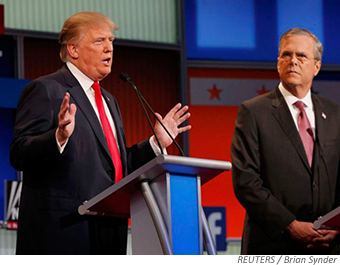Any leader who doesn’t stand up when it’s time to stand up will not be a successful leader for the long term.
A leader who is consistently unable or unwilling to stand up won’t ever get the chance to see if he could win in a fair, rule-based competition. Instead, as the saying goes, he’ll have to take his bat and ball and go home.
For a Bully, Silence Doesn’t Mean Strength
This post is about executive leadership, not politics, although it relies on a recent political example.

Whether Jeb Bush could have made a good president will never be known, because he didn’t even make it into the semi-finals. The voters never got to evaluate how smart he was, or how experienced, or how dedicated. It was clear that Jeb found Donald Trump’s attacks distasteful and inappropriate. But he barely made the attempt to counteract them: Instead, he sagged, fretted, and finally folded.
It can be excruciatingly difficult for rule-abiders to deal with a bully. This is particularly true when the bully, like Donald Trump, has absolutely no regard for appropriateness, fairness, or the truth, and wholeheartedly declares just about anything that will curry public opinion at that moment. (For a compelling illustration of this point, see John Oliver’s relentless debunking of multiple Trump claims, but be forewarned that the language in the video is not appropriate for work, children, or extreme fans of Downton Abbey.)
Unfortunately, most people prefer to affiliate with someone who looks strong, like Trump, on the assumption that strength signifies goodness and effectiveness. And they make the negative assumption that someone who remains quiet is weak or confused, and they write him off as helpless and hopeless.
Action Speaks Louder than Politeness
Some leaders, like Jeb, don’t wish to engage in overt or personal conflict. But any conflict-averse leader who doesn’t take visible, decisive action against transgressive behavior when it’s absolutely crucial to do so, loses automatically.
The more inappropriate the behavior — from a team member, a competitor, or even a customer — the more important it is that a leader enforce behavioral standards. Immediately. Because anyone who reacts promptly and with strength will be seen as more of a leader than someone with formal authority who raises objections but does not take action.
When a leader is visibly reluctant to engage in necessary conflict, his status is inherently diminished in the eyes of his followers. A leader who hesitates in the clinch will be seen as incompetent, ineffective, and fearful. No matter how legitimate it is to feel morally disgusted by transgressive behavior, disgust is only effective when it’s backed up by decisive action.
You can’t rely on normal courtesies when you’re dealing with a bully. You have to change the game — or figure out how to even the field you’re playing on. It takes energy, clarity, and conviction to show that you’re up to the fight — whether or not you want to fight — or the bully will carry the day.
Onward and upward,
LK

